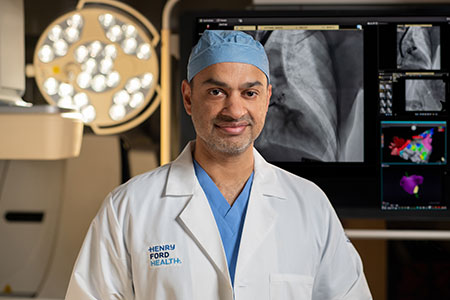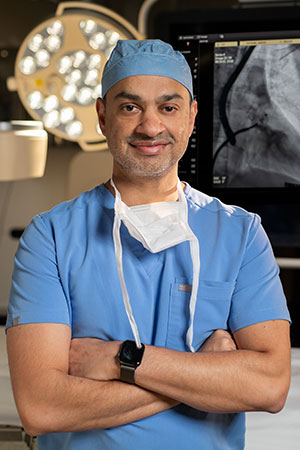I’m devoted to changing lives, in and out of the hospital. I Am Henry.
 By the time he was in his residency at Henry Ford Hospital, Dr. Arfaat Khan knew he was in the right place. It was here that his mentor, Dr. James McCord, fueled his interest in cardiac electrophysiology—the branch of cardiology that addresses electrical issues in the heart. Henry Ford was also where Dr. Khan witnessed a patient experience that would change him forever.
By the time he was in his residency at Henry Ford Hospital, Dr. Arfaat Khan knew he was in the right place. It was here that his mentor, Dr. James McCord, fueled his interest in cardiac electrophysiology—the branch of cardiology that addresses electrical issues in the heart. Henry Ford was also where Dr. Khan witnessed a patient experience that would change him forever.
“I was working in the cardiac ICU and a young patient came in with an acute heart attack,” Dr. Khan says. “He was going to die, and what amazed me was how quickly our team of cardiologists were able to take him to the cath lab, put in a stent and give him hemodynamic support to help his heart rest. It was the first time I saw someone who had death written all over them, but he was able to survive due to innovative technology and the dedication of the team.”
Since that formative experience, Dr. Khan has also witnessed game-changing innovation in the field of cardiac electrophysiology. Newer technologies have enabled physicians to perform arrhythmia procedures faster, more efficiently and safer than in years past, with better success rates. This evolution in technology has also made these life-changing procedures available to more patients.
“Knowing that the arrhythmia is never going to come back again, and that I’ve helped give someone a better quality of life, this is why I love my field.”
“There is no better feeling than to have a patient like John Ferguson, who comes in with a debilitating condition, and who leaves cured,” Dr. Khan says. “Knowing that the arrhythmia is never going to come back again, and that I’ve helped give someone a better quality of life, this is why I love my field.”
He is also excited about the changes in cardiac electrophysiology that are being driven by related technological advances, such as the Apple Watch and other wearable health monitors. As these devices evolve, it will give physicians like him even more diagnostic information to work with.
And yet, despite the impact that technology has had on cardiac electrophysiology and his patients’ lives, Dr. Khan knows the personal touch is just as important.
 “I want to make every patient feel like I’m there for them, and that I’m treating them like my own family,” he says.
“I want to make every patient feel like I’m there for them, and that I’m treating them like my own family,” he says.
That includes giving all patients his cell phone number, providing reassurance and answering those questions that just can’t wait. He’s done this since early in his career, but the power of this approach was reinforced in the past few years when Dr. Khan’s father passed away from lung cancer after a long battle. Throughout treatment, the oncologist was available whenever his family needed guidance and support.
Dr. Khan also appreciates the support he has received at Henry Ford Health, where he has worked since his residency.
“From providing tools to further enhance your career and supporting research, to fostering an inclusive, friendly environment, it is a great place for a physician to work,” he says.
In addition, Dr. Khan notes that there’s an emphasis on maintaining a good balance between work life and personal life. This flexibility allows him to pursue other opportunities in the community, changing lives outside of the hospital. This includes volunteering at his local mosque, where he organizes mental health, parenting and other programs. He also started a youth basketball league and helps coordinate day trips to places like Cedar Point.
“We’re working to foster a sense of community and belonging, providing resources to help address drug use, mental health issues and other challenges in schools,” he says.
“We’re working to foster a sense of community and belonging, providing resources to help address drug use, mental health issues and other challenges in schools.”
.svg?iar=0&hash=F6049510E33E4E6D8196C26CCC0A64A4)

/hfh-logo-main--white.svg?iar=0&hash=ED491CBFADFB7670FAE94559C98D7798)